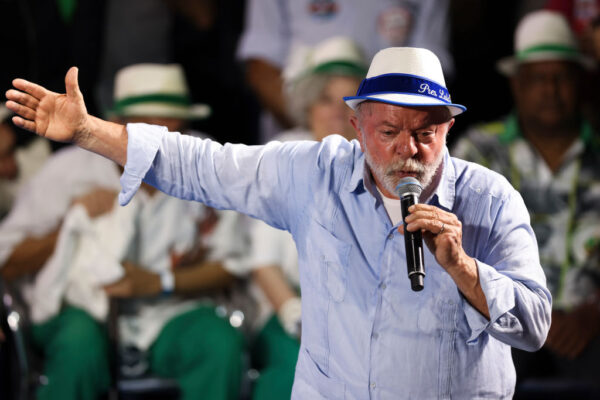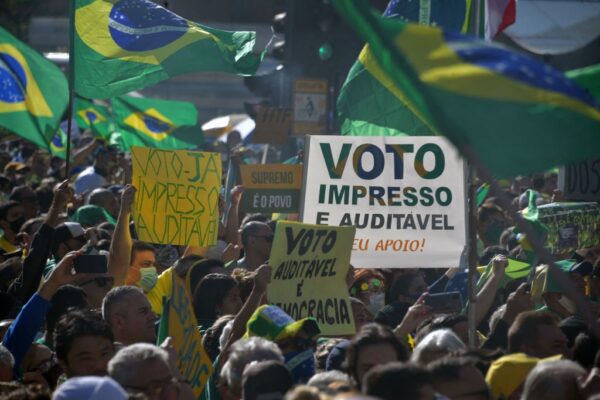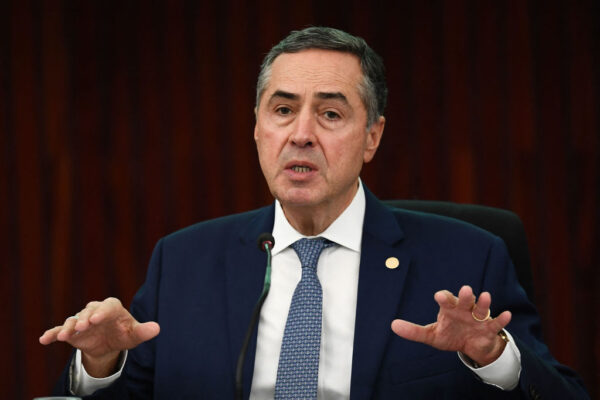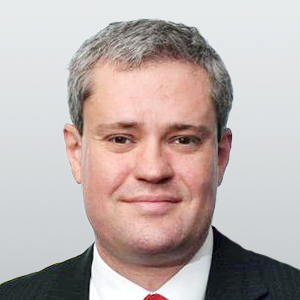Commentary
The second round of Brazil’s presidential elections was held this Sunday, Oct. 30. The former president, Lula da Silva, who has served prison time for corruption, won 50.9 percent of the vote, and the incumbent, Jair Bolsonaro, received 49.1 percent.
This is according to judges of the Electoral Superior Tribunal (TSE), Brazil’s top electoral authority.
Fair elections invariably involve paper-based voting or some paper trail that allows even electronic voters to have agency over the ballot count or to check their ballots themselves.
This is why most developed countries still use primarily paper ballots and physical ballot boxes made of canvas, plastic, and other non-electronic materials because it makes this easier.
With the current electronic voting system in Brazil, however, there is no absolute guarantee that Brazilians’ votes were exactly what they have cast in the ballot box because there is no actual hard copy register kept by the government for each vote cast electronically.
In other words, Brazilians are unable to confirm whether their votes were cast properly because, on Aug. 10, 2021, the Brazilian Congress failed to pass a constitutional amendment that would have required the printing of physical ballots that could be checked by the voter, thus providing a physical oversight to the electronic process.
Unfortunately, that important proposal was rejected in great part due to the strong political lobbying of the then-top electoral judge, Luís Roberto Barroso, who is also a Supreme Court judge.
He managed to convince enough MPs to reject these reasonable amendment proposals.
Government Losing Legitimacy Due to Judicial Involvement
Brazil has a Superior Electoral Tribunal (TSE) where its electoral judges create rules, decide on disputes, and even supervise the finances of electoral campaigns. Composed of seven members, three are elected by secret vote from among Supreme Court justices, and two others are elected by secret vote from among judges of the Superior Court of Justice (STJ), Brazil’s second-highest court. The remaining two are appointed by the president of the Republic among six lawyers nominated by Supreme Court justices.
Curiously, some of these top electoral judges campaigned openly and ferociously against one of the candidates—President Jair Bolsonaro. On February 19, for example, the then president of the electoral tribunal, Luis Roberto Barroso, spoke at the Texas University Law School on the rather peculiar topic of “Ditching a President.”
A few months later, he was a speaker at Oxford University when he got interrupted by two Brazilian Oxford students when speaking about the supposed reliability of electronic voting machines on June 25.
Like millions of other fellow citizens, those two students suspected that electronic voting machines might not be totally reliable and just wanted to have a check in the form of a physical register for each electronic ballot—a sheet of paper that could be printed so that citizens could confirm whether their votes were cast properly.
Further, on August 1, 2021, millions of people took to the streets of major cities in Brazil to protest against the apparent lack of transparency in the electronic voting system.
Due in part to the fact that, among other things, some unelected judges are ostensibly playing a political role that is not fitting to the judicial function, an opinion poll carried out by DataPoder360, released on June 15, 2020, revealed that the vast majority of Brazilians consider the performance of the judiciary regular, bad or horrible.
These judges are perceived positively by only 23 percent of the population.
The result demonstrates declining confidence in the courts and increased cynicism about the realisation of the rule of law in the country. Indeed, many Brazilians believe that the judiciary has been a critical factor contributing to a significant decline in the rule of law.
To be sure, this is not something new as, in the early 2000s, an opinion poll by Garibaldi-Fernandez in U.S. law professor William Prillaman’s book, ‘The Judiciary and Democratic Decay in Latin America’ revealed that 74 percent of Brazilians had no faith in judges.
Also, no less than 86 percent said that some people, including judges and politicians, are never adequately punished for breaking the law. Finally, around 50 percent disagreed with the opinion that judges normally punish the guilty and let the innocent go free.
The result demonstrated, according to Prillaman, that there is “nearly complete lack of faith in the judiciary and Brazil seemed to be on the verge of serious democratic decay, with the failure of the judiciary a critical factor contributing to the declining faith in the rule of law.
President-elect Only Allowed to Run Due to Technicality
This appeared to have changed when, in 2017, Brazil’s former president Lula da Silva, was sentenced to 12 years and one month in prison for widespread corruption and money laundering.
And yet, he spent only a year and a half in jail. In 2021, the Supreme Court annulled all these convictions on entirely technical grounds. This court did not say a word about Lula’s culpability, which was demonstrated in three court decisions, before nine judges, and in a series of criminal proceedings where there were numerous confessing witnesses, plea bargains and even the return of stolen money.
Instead, the court simply stated that the former president should not have been prosecuted in the city of Curitiba but rather in Brasilia, thus restoring Lula’s political rights that enabled him to run for this year’s presidential election.
In an interview on January 10, President Bolsonaro accused some of these unelected judges of “wanting Lula to be president”.

For example, Alexandre de Moraes, a Supreme Court justice who has assumed the presidency of the elections court overseeing the voting process, ordered social networks to remove thousands of posts and arbitrarily jailed supporters of the president without a trial for posts on social media that he claims “attacked Brazil’s institutions”, namely his own court.
In many cases, says an article in The New York Times: “Moraes has acted unilaterally, emboldened by new powers the court granted itself in 2019 that allow it to, in effect, act as an investigator, prosecutor and judge all at once”.
“It is an unprecedent role, turning the court in some cases into the accuser and the judge,” says Marco Aurélio Mello, a former Supreme Court justice,” the article reads.
Of course, it would be incredibly unwise for Brazilians to return a notoriously corrupt politician to the presidency. It is very hard to believe they would be so morally bankrupt to reward a notorious far-left politician such as Lula da Silva, who would then be able to finish the job he had started of turning Brazil into another Cuba or Venezuela.
So, was there a fair and transparent presidential election in Brazil? After all, as two U.S. journalists recently stated in The New York Times, “the court’s expanding influence could have major implications for the winner of the presidential vote.”
Views expressed in this article are the opinions of the author and do not necessarily reflect the views of The Epoch Times.
Source link





